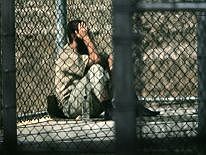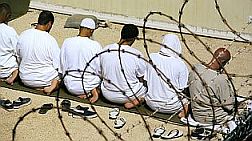 During the sentencing hearing, when Khadr should have had an opportunity to present mitigating facts, the judge barred the defense from presenting significant evidence of Khadr's ill-treatment while in custody. Additionally, because this case was a plea bargain, Khadr had to waive his right to appeal so none of the fundamental flaws of the military commission process that were a part of his case can be challenged.
During the sentencing hearing, when Khadr should have had an opportunity to present mitigating facts, the judge barred the defense from presenting significant evidence of Khadr's ill-treatment while in custody. Additionally, because this case was a plea bargain, Khadr had to waive his right to appeal so none of the fundamental flaws of the military commission process that were a part of his case can be challenged.
Presented with an admission of guilt that Khadr had previously adamantly denied, and with the limited case the defense put forward, it is no wonder the jury returned the sentence they did. Although the plea agreement set a maximum of eight years, the military jury (which, following ordinary courts-martial practice, was not told of the plea bargain) handed down a sentence of 40 years --- 15 more than even the prosecution had asked for. Coupled with the eight years Khadr has already spent in US custody, it amounts to a 48-year sentence. This, for someone who was only 15 years old at the time he committed the crime.
Click to read more ...
 I spoke with BBC Radio Wales this morning about the Obama Administration's decision, more than two years after it promised to close Guantanamo Bay, to hold military tribunals for the detainees at the facility.
I spoke with BBC Radio Wales this morning about the Obama Administration's decision, more than two years after it promised to close Guantanamo Bay, to hold military tribunals for the detainees at the facility. BBC Radio Wales,
BBC Radio Wales,  Barack Obama,
Barack Obama,  Guantanamo Bay
Guantanamo Bay 








